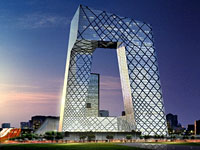Several of my posts here have addressed the often overlooked artform of architecture. Maybe it is because I used to love playing with Legos (Used to? I still do!), or because at one time I entertained notions of being an architect. Mostly, though, I think it is because of my disdain for contemporary church architecture that I find myself ruminating on the subject nowadays. Slate Magazine brings us this article about avant-garde architecture that is dotting the skylines of Arab nations and China.

It is an interesting phenomenon that Slate brings to mind -- the inability of humans to predict the future of cultural expressions. Undoubtedly, these buildings are influenced by at least three underlying desires: 1) the desire to be different; 2) the desire to be futuristic; 3) the desire to escape the bounds of the current status quo. However, what is often overlooked in these ventures is that if everyone desires to be different, then everyone ends up being the same. The person who is truly different is the one who doesn't mind "playing by the rules." So, buildings with classical architectural features are always more awe-inspiring than the "avant-garde" because we value the "sameness" that the architect was willing to preserve in his design. Also, when one examines the attempts of previous generations to be "futuristic" one sees a laughable product of ignorant prognostication which in fact never came to pass. For the best illustration of this, one only needs to watch an old re-run of the Jetsons to see what the creative minds of bygone days thought our century would look like. Across the world, designs that portended to be futuristic in their day dot the landscape, mostly being an eyesore. Some at best are nostalgic reminder of a former generations hopes and dreams. Finally, how does one escape the status quo when the status quo is escaping the status quo? This is the problem of postmodernism. If everyone gets to invent their own rules, their own "truth," their own categories, then how does one truly find a way to revolt against it? A simple suggestion -- we must return to objective reality and objective Truth (with a capital "T").
Perhaps Witold Rybczynski, the writer of Slate's article "Don't Count Your Titanium Eggs Before They've Hatched: Why Architects Can't Predict the Future" is trying to make the same point when he concludes the article with this statement: "The real question about new buildings should never be 'Are they cutting edge?' but 'Are they good?'" If we are left to live in a society without norms, without objectivity, without objective standards, then we will not be able to answer the question about something's goodness.

It is an interesting phenomenon that Slate brings to mind -- the inability of humans to predict the future of cultural expressions. Undoubtedly, these buildings are influenced by at least three underlying desires: 1) the desire to be different; 2) the desire to be futuristic; 3) the desire to escape the bounds of the current status quo. However, what is often overlooked in these ventures is that if everyone desires to be different, then everyone ends up being the same. The person who is truly different is the one who doesn't mind "playing by the rules." So, buildings with classical architectural features are always more awe-inspiring than the "avant-garde" because we value the "sameness" that the architect was willing to preserve in his design. Also, when one examines the attempts of previous generations to be "futuristic" one sees a laughable product of ignorant prognostication which in fact never came to pass. For the best illustration of this, one only needs to watch an old re-run of the Jetsons to see what the creative minds of bygone days thought our century would look like. Across the world, designs that portended to be futuristic in their day dot the landscape, mostly being an eyesore. Some at best are nostalgic reminder of a former generations hopes and dreams. Finally, how does one escape the status quo when the status quo is escaping the status quo? This is the problem of postmodernism. If everyone gets to invent their own rules, their own "truth," their own categories, then how does one truly find a way to revolt against it? A simple suggestion -- we must return to objective reality and objective Truth (with a capital "T").
Perhaps Witold Rybczynski, the writer of Slate's article "Don't Count Your Titanium Eggs Before They've Hatched: Why Architects Can't Predict the Future" is trying to make the same point when he concludes the article with this statement: "The real question about new buildings should never be 'Are they cutting edge?' but 'Are they good?'" If we are left to live in a society without norms, without objectivity, without objective standards, then we will not be able to answer the question about something's goodness.
Powered by ScribeFire.
No comments:
Post a Comment